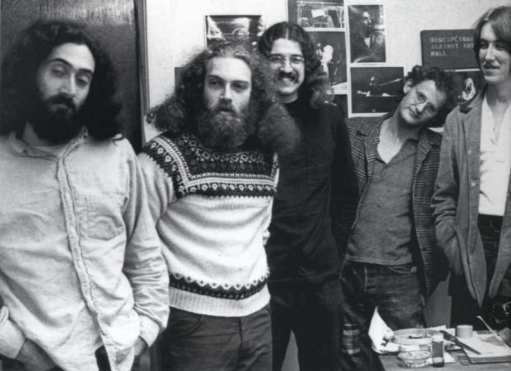 |
|
Notes From a Rocker By Spencer Perskin Austin Chronicle, 1992 Among the various rationales for starting a rock band, the most important to me is the transformation of creative energy into art. I was a trained classical musician, frustrated from having the tools but lacking the thrill of primal creativity. When Shiva’s Headband was launched in the fall of 1967, there wasn’t a hint of the now-bustling music biz in our town. To perform only original material was considered almost outrageous by our musician friends, and there was zero tolerance for us at the few bars around town (serving beer-only at that time). Only the opening of the Vulcan Gas Company gave us the foothold we would need. The original band, Bob Tom Reed on guitar, Kenny Parker on bass, and Jerry Barnett on drums was soon joined by keyboardist Shawn Siegel. My wife Susan, who had given the band its name, performed from time to time as pregnancy and kids would permit. As dedicated as we are to making music, we are more dedicated to our family. In fact, it was the family life that kept me from going on long tours; we basically played around the state, and then almost always on weekends. Ironically, we came to earn a pretty good living this way, better than we, or many folks, are doing today. Perhaps the message is that musicians do better when they sell music and not alcohol. I always saw Austin as a potential music town. The political atmosphere coupled with the interest in folklore at UT together with the rising anti-war movement promised an especially fertile ground for the kind of scene already in full swing in the San Francisco area. In fact, there has always been a firm Austin/San Francisco connection. I, for one, wanted a similar cultural/fun experience for “our people.” “It’s like a tribal thing, and the kind of music we played just could not be nurtured by the Cali soil.” Like Sue says, “I don’t hate California; it just ain’t my style.” So I suppose that’s why we had to begin the band in Austin. It has been suggested recently that to get back to “Austin” today you might have to go to Amsterdam. However, memory often employs a filter that lets us remember only the good stuff when, in reality, it was hard times all the way. We were plainly anti-establishment, as we still are, and the system perhaps more Draconian than today. Today we fight a different kind of war, to take back our society from enemies within, and to attempt to re-teach America the ways of a true democracy. I just take my revolutionary tendencies and try to turn them into art; letting the notes fly instead of bullets, trying to expand consciousness and life rather than suppressing feeling and destroying life. I should note, though, that two former band members are currently prisoners of war, and our thoughts go out to them continually. Well, I can’t seem to get any farther without mentioning that place represented by the letters AWHQ. If I want to be proud of something it must be our part in the founding of the Armadillo World Headquarters. The last thing the Capitol Records folks said to me at the contract signing was, “this money is not for you to start a rock club in Texas with.” Burned that bridge right off the bat. Brian Rohan was our lawyer in the record deal we got with Capitol, and he and they wanted us to move to California. I, on the other hand, was determined to get the music business established in Austin. We wanted a place to play in our home town and the Vulcan had shut down. I also wanted to bring major acts to town who were passing us up for lack of a middle-sized venue. I considered bringing Freddie King and Ravi Shankar, The Incredible String Band and Taj Mahal to Austin for the first time worth the sacrifice. Of course, the place could not have lasted a minute without all the dedicated staff and friends, in and out of the business. It began and was sustained for a long time by the very community it was designed to serve. Almost all of those who participated in the effort will agree that it was a tribal thing; together we are more than the sum of our parts. It should also be noted that artists played a major role in the Armadillo community. Poster art for shows might be the best record of the events that took place. The music, though central, is still only one aspect of creative energy. The Vulcan and Armadillo experiences laid a firm groundwork for the popular expression of drama, dance and even artisanship so prevalent in Austin. If we were to gather all the folks who played with the Headband, and all the folks who worked at and helped with the Armadillo or with Shiva’s, we would have a group of thousands. Over the years nearly one hundred musicians, managers and roadies have worked and played with us. The Headband for 1993-Steve Whitfield, James D. Speer, Ron Hafter, Susan Perskin and myself are continually aware of the history we represent; and though there are some aspects of the scene we don’t care much for, still we’ve seen the infant grow into adolescence, and we share the concern that the end result should be a healthy and mature music scene/industry that encompasses the values of the community that gave it birth. The past, as they say, is prologue. My next bumper sticker will say “Remember the Future.” Lovers, friends, fellow citizens, I thank you all. Spencer Perskin studied classical violin at Southern Methodist University from ages 10-18. Shiva’s Headband put out an album on Capitol Records, Take Me To The Mountains, in 1970, followed by several other indie releases. |
|
|